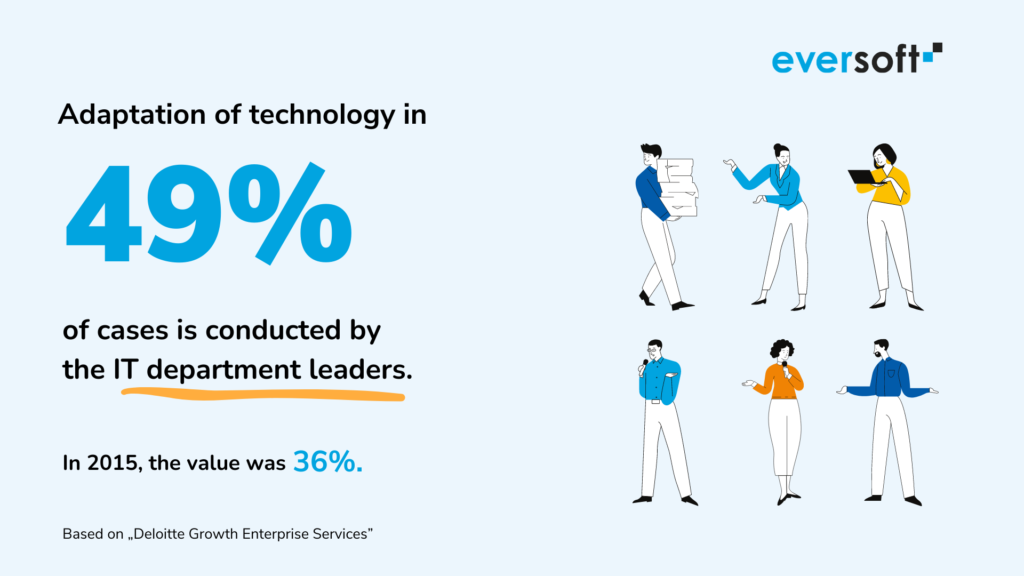CIO and the full circle in understanding his competencies, that was worth coming
We live in times, where we are bored with cliché about digital transformation encompassing even the least obvious, most analogue aspects of enterprise operations. In result, the statement, that the role of persons responsible for digitalisation of these enterprises, is proportionally becoming a cliché.
Who is the CIO of today?
However, around the role of the CIO and CIO competencies, a large number of myths and misunderstandings have arisen, including even statements, that the CIO is not CEO’s right hand, but his natural successor. Therefore, it would be advisable to dispel a part of these beliefs and answer the question:
What is the actual impact of a Chief Information Officer person, on the shaping of the company’s policy?
In order to answer the question, it is primarily necessary to summarise the current beliefs. These can be contained in a statement, that due to the fact, that swift digitalisation is to have direct impact on the competitiveness of an enterprise, the CIO’s role is increasingly significant. Particularly, as CEOs must not always be ahead of the curve in terms of technical competencies, and the CIOs are to be a supplementation of their management skills in this unknown territory.
CIO competencies – perception disruptions
The fact, that these beliefs are widespread at the highest management level is demonstrated i.a. by the „Deloitte Growth Enterprise Services”. Based on a poll study performed on a group of 500 enterprise managers with income ranging from 100 million and 1 billion USD, it was demonstrated that the adaptation of technology in 49% of cases is conducted by the IT department leaders. When a similar study was conducted in 2015, the value was 36%.

The aforementioned may lead to far-fetched conclusions – the increase reported just a few years ago is gigantic, which is obviously positioned within the context of the most popular trends: cloud migration, application of intelligent algorithms, so that the companies may process large amounts of data, and finally, the automation of processes.
According to Gartner analysts, in result, until 2021, CIOs will shape the corporate culture just as HR department directors do it now.
CIO competencies – dispelling the evolution
Such overview of the situation, leads many to believe in the evolution of the CIO role – the development is to commence by expansion, acquisition of authority and taking decisive positions on a growing amount of issues. The presented Deloitte study, demonstrates the widespread belief that CIOs play an advisory role for the CEO, and supplement their competencies with own technological knowledge. However, is this notion correct?
An interesting answer to the question is given by Thornton May, author of the book titled „The New Know: Innovation Powered by Analytics”. Interestingly, he is criticising notions regarding the evolution of CIO role not by referring to futurology, being his area of expertise, but by using facts from the past, particularly to the moment, when the CIO position had been created for the first time. It happened in the early 1980s, with William Synnot of the Bank of Boston, being one of the pioneers of such form of organisation.
The CIO does not evolve, it is our perception that is maturing
In 1981, at the Bank of Boston realisations were made, that the digitalisation process will not be limited solely to process automation, and using computers as computational machines. It was realised (correctly, as time has proved it), that the process would pass beyond the narrow framework and revolutionise every aspect of the company’s operations. Importantly, including the aspects strategic for its functioning and maintaining competitiveness.
The forms of higher management level organisation were not prepared for the necessity of realising something as exotic as an IT strategy, by an enterprise. The newly established Chief Information Officer position was to fill the gap in every field. In result, already 40 years ago, the CIOs were expected to have direct and meaningful impact on the aforementioned strategic aspects of company’s operations.
CIO competencies in 2021
If we compare the aforementioned, current studies with the original CIO role, we come upon interesting conclusions. It turns out that this „evolution” of current CIOs, based on the increase of their impact, is going in the direction of the competencies already proposed by i.a. Will Synott. Therefore, we may be tempted to state, that that we have come full circle and that it is not the CIO that is increasing, but it is us – after almost a half of the century – have finally began to understand it correctly.
Within the context, the Deloitte study gets an entirely new meaning. Suddenly, we realise that the 49% of cases where the CIOs decide on technology adaptation, is unreasonably low, because who else should decide on these matters if not CIOs?
We can only be glad, that this percentage is growing swiftly, and so the CEOs will state with more confidence, that the transformation of their enterprises is in good hands.




